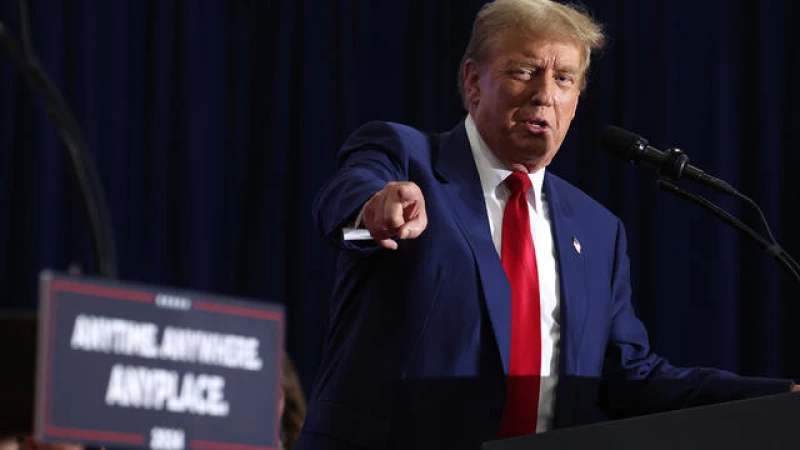Following a financial crisis, former President Donald Trump managed to post a $175 million bond in New York on Monday. This move temporarily halted the enforcement of a $460 million judgment against him as he awaits the outcome of his appeal in a civil fraud trial.
However, experts have pointed out that the surety bond was deficient in crucial information usually included in such filings. This missing information comprises documents concerning the power of attorney for the bond provider, Knight Specialty Insurance Company, the company's financial statement, and a certificate of solvency from the Department of Financial Services.
Attorney Bruce H. Lederman, who has extensive experience in filing bonds in New York, highlighted significant issues with the bond. Lederman noted the absence of a certificate of solvency under Section 1111 of New York Insurance Law, which is typically required to confirm the bond issuer's licensing to issue a surety bond.
Lederman observed that Knight Specialty is not included in New York's Department of Financial Services website.
On Wednesday, Trump's attorneys had the bond filing returned to them by the New York Supreme Court clerk's office "for correction." The reason for the correction request was not publicly specified.
Adam Pollock, a former assistant attorney general in New York, stated, "This bond is deficient for a number of reasons."
"This includes the fact that the company does not seem to be licensed in New York and does not appear to have sufficient capital to fulfill this obligation," Pollock explained.
Knight Specialty is not licensed in New York to issue surety bonds, and it was observed by Lederman that the company is not listed in the Department of Financial Services database. However, the company argues that it is still authorized to issue the bond.
Additionally, the company seems to not comply with a restriction in New York insurance law that prohibits companies from risking more than 10% of their capital.
Amit Shah, the president of Knight Insurance, stated that this restriction does not apply to them. He mentioned that Knight has equity exceeding $1 billion.
"Knight Specialty Insurance Company is not a New York domestic insurer, and New York surplus lines insurance laws do not regulate the solvency of non-New York excess lines insurers," he clarified. "Therefore, we do not believe we are subject to the 10% surplus requirement."
The chairman of Knight Insurance, Don Hankey, stands as the mastermind behind Trump's bond.
Hankey disclosed that Trump utilized a sum of $175 million in "cash" as collateral for the bond.
"First he furnished about $120 million worth of bonds that we OK'd, so we assumed it would be investment-grade bonds and cash. But as it turned out, it was all cash," he mentioned in a brief phone call with CBS News.
Trump has retained the $175 million cash collateral, confirmed by Shah, who stated that the money is secured in an undisclosed account pledged to the company. The premium paid by Trump to the company remains confidential.
"It seems to me that the underlying case is about the [New York] attorney general requiring strict compliance with the law," stated Lederman.
"The law requires an insurance company posting a surety bond to be authorized in New York," he continued. "And there are serious questions about if this bond was properly posted."
As per the New York law CPLR 2502, an "insurance company [shall be] authorized to execute the undertaking within the state."
When CBS News asked Hankey about Knight Specialty's authorization to issue bonds in New York, the company's net worth and potential deficiencies in the bond filing for Trump, he deferred to Knight's president: "I'm chairman of that company. I've got several other companies that I own. Amit Shah would be the person to talk to."
Shah explained that the company is authorized to issue a surety bond in New York through the Excess Line Association of New York (ELANY). He said the company is approved by ELANY to issue bonds from its home domicile state of Delaware, where it is allowed to write surety bonds.
"Our position is we're compliant," said Shah.
Knight's compliance officer, Mike Pepitone, said that there are a number of insurance companies that do not hold a license in every state, but a company is able to write a bond in other states where they are not licensed on what he said is called "an excess and surplus lines basis."
"For court bonds, as regulated by the CPLR, the law is clear about in-state license requirement," said Pollock, who noted that there are surety bonds used in other industries like construction that would not be subject to that rule.
Shah initially said that the company had in fact submitted a financial statement with the bond. However, during a conversation the following day, Pepitone said the financial statement was not supposed to be a part of the filing and was "not willing" to share it with CBS.
Should Knight Specialty fail to possess Trump's cash collateral for the bond, Lederman raised doubts about the company's ability to immediately fulfill payment in the event of Trump's appeal loss. Lederman suggested that New York Attorney General Letitia James should launch an investigation to ascertain whether the company is adhering to state law requirements.
"The attorney general could have sufficient grounds to challenge the validity of this appellate bond in New York State," Pollock stated.
The New York Attorney General's office chose not to provide any comments on the matter.







